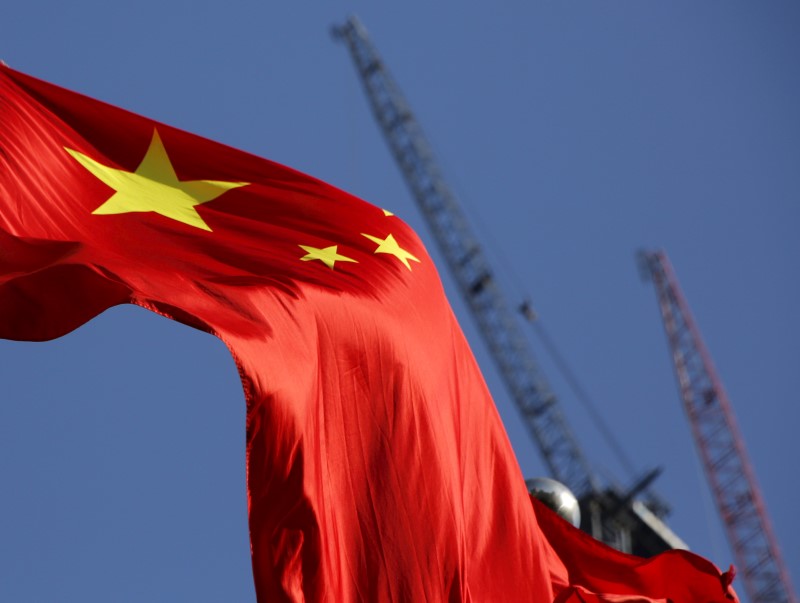(Bloomberg) -- One of the most opaque areas of China’s credit markets involves the practice of companies buying their own bonds. That may soon get a lot tougher, contributing to financing difficulties that are already bedeviling the nation’s policy makers.
At issue is a sharp increase in scrutiny by financial institutions of the collateral that their counterparties offer up in the repurchase market, a crucial channel for short-term funding. If the debt sold by issuers that indirectly purchased a portion of their own bonds -- which could account for as much as 8% of China’s corporate bonds, according to Citic Securities Co. -- is shunned, that will squeeze liquidity for a swathe of the nation’s businesses.
Despite regulators’ actions to prevent any seizing up in the repo market and short-term collateralized lending between banks, some institutions still moved to avoid riskier securities. The moves have showcased the fragility of confidence toward borrowers that lack state backing in a financial system still dominated by state-sector banks.
For firms that obtained funding via unorthodox methods, conditions may become particularly challenging. One of those practices is known as structured issuance, where a company will transfer cash to an asset manager to buy a slice of the bonds the company is itself selling. The manoeuvre helps give the appearance of greater demand for its securities and stronger ability to obtain funding. What could make the practice untenable is if asset managers can no longer use those securities held in custody as collateral for repos.
“Since some repo transactions have defaulted recently, it is unclear whether companies can continue to borrow money from the structured issuance method, said Meng Xiangjuan, chief fixed-income analyst at SWS Research Co. in Shanghai. “If it stops, some issuers will certainly face difficulties operating their business normally, and their debt-repayment pressure will rise,” she said.
CHINA DEFAULT WATCH: Three More Companies Missed Payments
While the practice of self-financing a portion of bond issuance is well known among credit analysts and ratings companies, observers have been loath to name the firms involved, making this a particularly murky part of China’s debt market. Citic Securities, for its part, hazarded a total of about 1.5 trillion yuan ($218 billion) worth of securities outstanding that were sold in part via structured issuance.
A shock takeover of Baoshang Bank Co., a city commercial lender linked with conglomerate Tomorrow Group, has had cascading effects. One of the readily quantifiable ramifications has been to raise the funding costs for lower-rated banks, as seen in the rates on their negotiable certificates of deposits.
Another impact has been the shock to confidence after regulators warned that Baoshang’s interbank creditors might face losses. They have since had to fight a rearguard action to encourage banks to sustain their interbank and repo operations, and the People’s Bank of China has had to pump liquidity into money markets to avert any systemic upset.
Concern became so great that the China Foreign Exchange Trading System, an arm of the PBOC, set up a procedure for the orderly resolution of defaulted repo transactions, pledging to conduct anonymous auctions of the bonds used as collateral -- a move that hides the name of the counterparty that defaulted.
Regulators’ actions have averted a broader surge in premiums for lower-rated borrowers, such as local government financing vehicles that analysts say account for a portion of structured issuance. But strategists remain concerned that the days of such an unconventional fund-raising strategy may be numbered if the securities are no longer accepted as collateral for financial transactions.
“In the short run, companies that rely on structured issuance definitely have to sell bonds at higher yields to attract investors,” said Brian Lou, portfolio manager from UBS Asset Management in Shanghai. “Everyone knows the funding chain is really fragile after the Baoshang Bank seizure, and the most important task for institutional investors right now is to allocate assets better and improve risk management.”
(Adds a tout.)
To contact Bloomberg News staff for this story: Tongjian Dong in Shanghai at tdong28@bloomberg.net;Qingqi She in Shanghai at qshe@bloomberg.net
To contact the editors responsible for this story: Neha D'silva at ndsilva1@bloomberg.net, Christopher Anstey, Lianting Tu
©2019 Bloomberg L.P.
